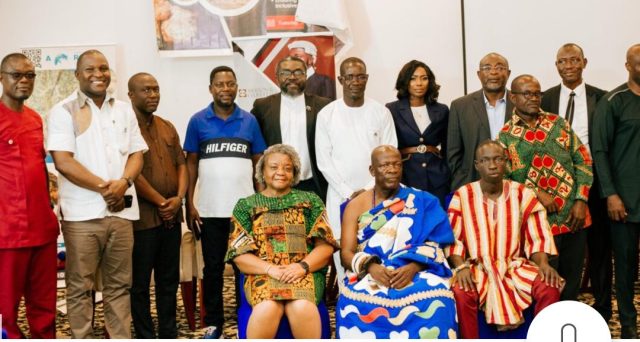A coalition of civil society organizations, traditional leaders, and affected community members have strongly criticized the government’s compulsory land acquisition policies, calling for urgent reforms to ensure fairness, transparency, and community inclusion.
At a multi-stakeholder forum held in Accra on March 26, 2025, representatives from A Rocha Ghana, Wacam, the Centre for Public Interest Law (CEPIL), Merton & Everett LLP, and Oxfam Ghana raised concerns over the government’s use of eminent domain, arguing that it often disproportionately benefits multinational mining corporations at the expense of local communities.
The forum, themed “Rethinking Compulsory Land Acquisition and FPIC in the Extractive Sector: Ensuring Equity, Environmental Sustainability, and Inclusive Development,” brought together regulatory bodies, civil society groups, and representatives from Tano North and Nzema communities—areas that have suffered the brunt of forced land seizures.
Participants emphasized the frequent lack of Free, Prior, and Informed Consent (FPIC) in these land acquisitions, which they say has led to economic displacement and environmental degradation. Many community members lamented that the government grants mining permits without consulting traditional leaders or affected families, resulting in forced evictions and loss of livelihoods.
Nana Aka Nwonza, Divisional Chief of the Bakata community in the Ellembelle District, highlighted the troubling trend of mining companies arriving unannounced on community lands, citing government-issued permits as justification for their operations. “The companies just storm our lands to commence commercial mining projects. When we challenge them, they claim the government has already granted them permits,” he said.
Mr. Joseph Adu, Secretary of the Concerned Farmers Association-Terchire, recounted how compulsory land acquisition in favor of Newmont Ghana Gold Limited had left many farmers landless and struggling to survive. “The government took our farmlands and handed them to multinational companies, leaving us with nothing,” he stated.
Legal experts at the forum, including Lawyer Augustine Niber of CEPIL and Oliver Barker-Vormawor of Merton & Everett LLP, dissected Ghana’s legal framework on compulsory land acquisition. They noted that while the 1992 Constitution and the Lands Act of 2020 (Act 1036) provide guidelines for land acquisition, enforcement has been inconsistent, often sidelining affected communities.
To address these concerns, stakeholders called for robust legal and policy reforms. Key recommendations included ensuring proper community engagement before land acquisition, enforcing FPIC principles, and guaranteeing fair compensation and resettlement for displaced communities.
Mrs. Hannah Owusu-Koranteng, Associate Executive Director of Wacam, reinforced the need for a balanced approach. “The government must find a way to drive economic development while protecting the rights of citizens. There needs to be a structured and transparent engagement process before any land is taken,” she stated.
The forum concluded with a strong appeal for increased accountability and the protection of indigenous land rights, urging the government to reconsider its approach to land acquisition in the extractive sector.
Send your news stories to newsghana101@gmail.com
Follow News Ghana on Google News















